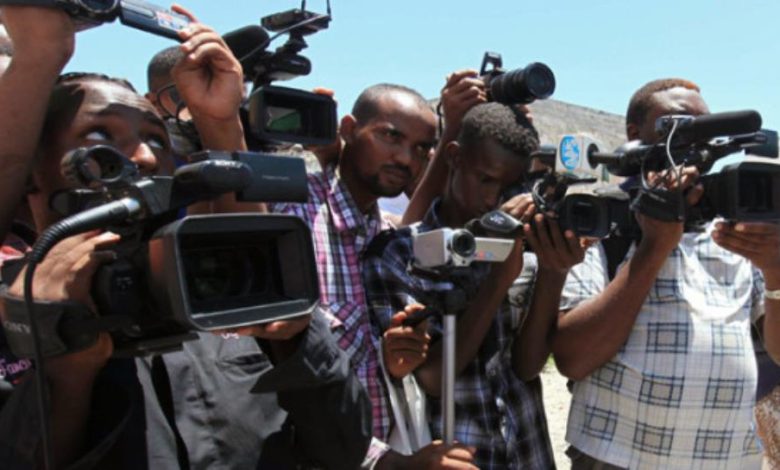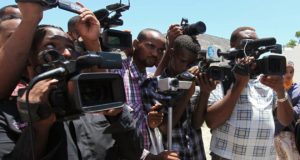
Court stops Buhari, National Broadcasting Commission from shutting down 53 broadcast stations
The Federal High Court in Lagos State has stopped President Muhammadu Buhari and the National Broadcasting Commission (NBC) from revoking the licences of 53 broadcast stations in the country and shutting them down on the grounds of failing to renew their licences.
Penpushing reports that Justice Akintayo Aluko, issued the order of interim injunction on Monday, restraining the authorities from carrying out their revocation threat in a ruling on a motion ex parte, and after issuing the interim order, adjourned until 8 September, for the hearing of the motion on notice for interlocutory injunction.
The highlights of the ruling was made available by Kolawole Oluwadare, an official of the Socio-Economic Rights and Accountability Project (SERAP),explaining that the order would afford the defendants, an opportunity to give their defence to the suit and give reasons why the restraining order should be reversed.
Penpushing further reports that, it is recalled that National Broadcasting Commission (NBC) had in August 19, 2022 revoked the licences of 53 broadcast stations on the grounds of their failure to pay their licence renewal fees cumulatively worth N2.66 billion, and ordered those that were unable to pay to shut down at 12 am on 20 August.
The commission cited section 10(a) of the 3rd Schedule of the National Broadcasting Commission Act CAP N11, Laws of the Federation of Nigeria, 2004 to back its decision against the stations, which reads that, a licence may be revoked by the Commission in the following cases, that is (a) where the prescribed fee has not been paid on the due date..

Penpushing also reports that, Socio-Economic Rights and Accountability Project (SERAP) and Nigerian Guild of Editors (NGE), however, filed the motion ex parte along with the main suit challenging the commission’s planned action against the broadcast stations.
The International Press Institute, Nigerian Chapter, in the same vein intervened, hence the National Broadcasting Commission (NBC) suspended the revocation of the operating licenses of the 52 broadcast stations.
Penpushing reports that, the extension was granted after institute engaged the Ministry of Information and Culture, National Broadcasting Commission (NBC) and the Broadcasting Organisation of Nigeria (BON) to explore an amicable resolution of the dispute.
The National Broadcasting Commission (NBC) by the extension, therefore directed all the stations to pay all outstanding license fees on or before 23 August, 2022 or shut down by 12 am on 24 August, but Socio-Economic Rights and Accountability Project (SERAP), and Nigeria Guild of Editors (NGE) sued the commission and Buhari on 23 August.
Penpushing further reports that, the two bodies asked the court for a declaration that section 10(a) of the Third Schedule to the NBC Act used by commission to threaten to revoke the licenses of 53 broadcast stations and to shut down the stations is unconstitutional and unlawful, as it violates freedom of expression.”
The bodies in the suit asked the court for an order of interim injunction restraining Buhari and the commission, their agents from revoking the licenses of 53 broadcast stations in the country and shutting down their operations, pending the hearing and determination of the motion on notice filed contemporaneously in this suit.”

Penpushing also reports that, the bodies urged the court to determine whether section 10(a) of the Third Schedule to the National Broadcasting Commission (NBC) Act used by the commission to threaten to revoke the licences of 53 broadcast stations and shut them down is not in inconsistent with freedom of expression and access to information.”
The complainants urged the court to declare that section 10(a) of the National Broadcasting Act used by the commission to unilaterally revoke the licenses of the broadcast stations and shutdown the stations is a violation of the constitutionally and internationally guaranteed right to a fair hearing.
Penpushing reports that, Socio-Economic Rights and Accountability Project (SERAP) and Nigerian Guild of Editors (NGE), maintained that the provisions of the Nigerian Constitution and human rights treaties on freedom of expression “indicate that this right can be exercised through any medium.”
“Effectively, these provisions recognise that every individual has the right to an equal opportunity to receive, seek and impart information through any communication medium without discrimination’, the suit added.
“The use of NBC Act and Code, in this case, would inadmissibly open the door to arbitrariness and would fundamentally restrict the freedom of expression that is an integral part of the public order protected the Nigerian Constitution and human rights treaties to which Nigeria is a state party.”
“The media plays an essential role as a vehicle or instrument for the exercise of freedom of expression and information – in its individual and collective aspects – in a democratic society. Indeed, the media has the task of distributing all varieties of information and opinion on matters of general interest.”
“The public has a right to receive and assess this information and opinion independently. Therefore, the existence of a free, independent, vigorous, pluralistic, and diverse media is essential for the proper functioning of a democratic society.”

“Revoking the licenses of 53 broadcast stations and shutting down their operations because they have not renewed their licenses would both seriously undermine the rights of millions of Nigerians to express their thoughts, and their right to seek, receive, and impart information and ideas of all kinds, in any medium they choose.”
Penpushing reports that, the bodies pointed out that they recognised the mandates of the commission to regulate broadcasting, but argued that the exercise of such mandates including renewals or revocation of licenses must follow the thresholds and guidelines set by the right to freedom of expression.
“The free circulation of ideas and news is not possible except in the context of a plurality of sources of information and media outlets. The lack of plurality in sources of information is a serious obstacle for the functioning of democracy.”
“The NBC Act and Broadcasting Code cannot and should not be used in a manner that is inconsistent and incompatible with a plurality of voices, diversity of voices, non-discrimination, and just demands of a democratic society, as well as the public interest.”
FOOTNOTE: You want to share story with us? You want to advertise with us? You need publicity for product, or service, or event? Contact us on WhatsApp +2348073463653 or email penpushing@yahoo.com







